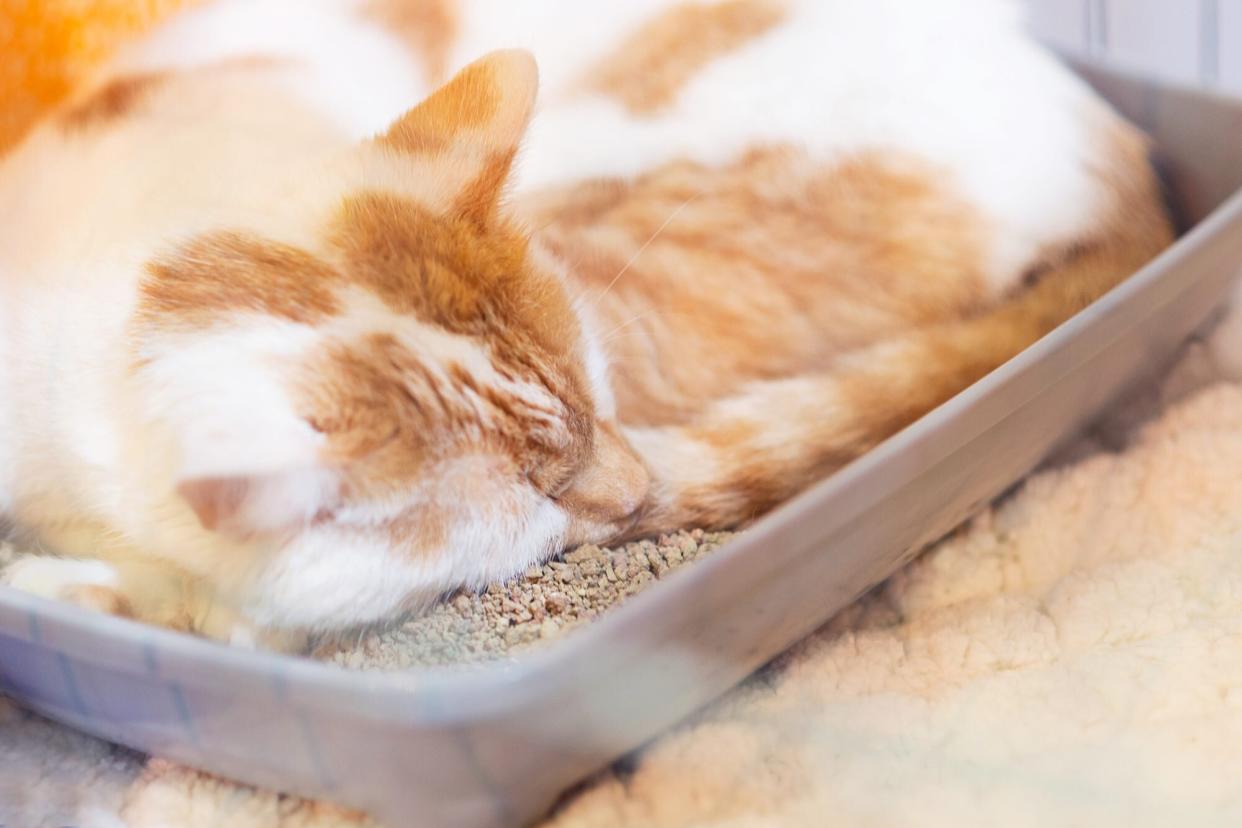Why Is My Cat Sleeping in the Litter Box? A Cat Behaviorist Gives Us the Scoop

pp1 / Shutterstock
Cats possess an enviable talent for being able to sleep just about anywhere. But if your adult kitty suddenly starts snoozing in their litter box, your admiration may switch to concern—and with good reason, says Amelia Wieber, a certified cat behavior consultant and the owner of Caring Behavior LLC. That's because litter box catnaps can be a sign of a bigger problem and can even create problems of their own.
Reasons Why Your Cat is Sleeping in the Litter Box
While your cat may simply find her litter box to be a cozy and safe space (especially if it's been recently cleaned), it's typically not normal for felines to sleep in what is essentially their toilet. The possible reasons behind this behavior are many, but Wieber separates them into two main categories: medical and behavioral.
Medical
If your cat abruptly abandons her bed to sleep in the litter box, Wieber says you'll want to contact your veterinarian to rule out an underlying medical issue first. She says many cats instinctively hide when sick, so your cat may be feeling poorly and the litter box is simply their hiding place of choice. Additionally, there are certain illnesses that can keep them tethered to the toilet, such as:
If your older cat is sleeping in the litter box, it could be a sign of arthritis. Painful joints can make movement more difficult, and your cat may find that the litter box is easier to access or get in and out of than their usual napping nook. Another possible root cause in older cats is cognitive dysfunction, or dementia. Your cat may simply be confused and disoriented, causing the lines to blur between where they toilet and where they relax.
Behavioral
We know we're preaching to the choir here, but cats are sensitive, observant creatures. And as such, they can become stressed for a variety of reasons. When tensions are high, cats often retreat to hide in areas that feel familiar and secure. And because litter boxes are often placed in out-of-the-way locations, Wieber says your cat may see it as the safest spot to escape whatever's bothering them, particularly if the litter box is your cat's only covered hiding space.
So if your veterinarian rules out any medical causes, you might want to explore possible sources of stress in your cat's environment. These include things like:
Moving or remodeling
Competition between cats in multi-cat households
Loud sounds (e.g. parties, nearby construction, storms)
Generally speaking, anything that disrupts your cat's normal daily routine can also disrupt their normal behavior, including where they sleep.
If the pet in question is a recently adopted kitten or adult cat who's spent their life within the tight confines of a cage, they may have simply grown accustomed to sleeping near (or in) their litter box. Or in the case of the kitten, they may still be learning the difference between the restroom and where they rest.
Can Sleeping in the Litter Box Make Your Cat Sick?
Unfortunately, it can.
Litter box sleeping isn't just a potential sign of a bigger problem. The act itself can cause issues for your cat. "It's certainly not ideal for a cat to sleep in the area where she urinates and defecates," Wieber explains. "It could lead to bacterial infections of the eyes, ears, and perhaps the bladder." Skin infections can occur as well. Moreover, she notes that if litter gets caught in your cat's fur while they're catching some z's, grooming could transfer those clay chunks to their digestive tract and cause a blockage.
How to Stop Your Cat From Sleeping in the Litter Box
How you get your cat to stop sleeping in the litter box will depend on why your feline companion is there in the first place. The cause dictates the fix.
1. Visit the Vet
The first step is to visit your veterinarian so they can check your cat for any underlying medical issues. Keep in mind that even if the cause is medical, you may need to make some environmental changes as well.
All cats need comfortable hiding places, says Wieber—including options that are up off of the ground. She adds that this is especially important if you've recently added a new pet to your home.
Check out the Indoor Pet Initiative at The Ohio State University to review your cat's environment and correct any deficiencies.
RELATED: I Tried This Mini Catio From Etsy—Here's What My Cats Thought
2. Consult a Behaviorist
If you suspect the main impetus behind your cat's new sleeping spot is stress or some other behavior issue, Wieber says you may want to partner with a certified cat behavior consultant or board-certified veterinary behavior specialist to pinpoint what's causing the unrest. "They will be able to help you desensitize your cat to stressors that cannot be completely mitigated [e.g. a new baby]," she explains, "and can help you create alternative resting places for your kitty."
Regardless of the cause, don't expect a fast fix. It may take a while before your cat feels more comfortable sleeping somewhere else. In the meantime, you can use kitty cuddle times as an opportunity to both connect with your cat and remove any litter that's gotten caught in their fur mid-snooze.

